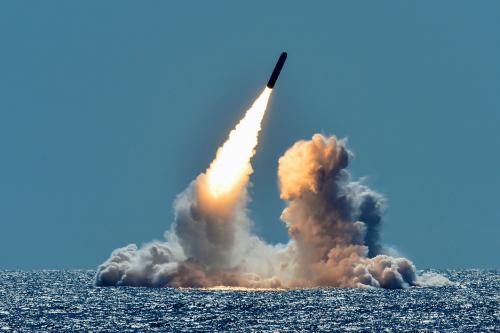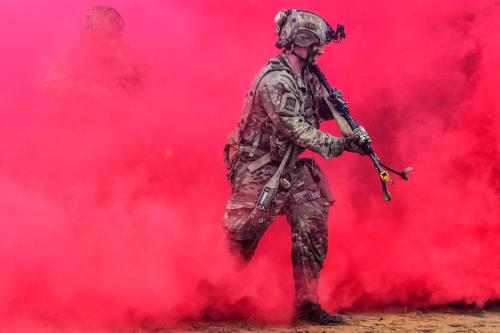It is likely that arms control talks between the U.S. and Russia will resume later this year, which will touch on issues that affect Germany and NATO. Steven Pifer explains why Berlin should begin considering now how they will impact German and European security. This post originally appeared in Internationale Politik Quarterly.
The administration of U.S. President Joe Biden has indicated that it intends to seek “credible, serious, clear-eyed negotiations with [Russia] on hard strategic stability issues.” That envisages a broad set of issues, as strategic stability today is a far more complex concept than it was during the Cold War. It involves countries other than just the United States and Russia. And it is a matter not just of strategic offensive nuclear forces but of missile defense, long-range precision-guided conventional strike systems, and cyber capabilities, among others.
How U.S.-Russian strategic stability talks develop and what happens in ensuing negotiations could well impact German and European security. U.S. Secretary of State Antony Blinken has said Washington seeks to engage Russia in “arms control that addresses all of its nuclear weapons.” That would include Russian non-strategic nuclear weapons, which would mean that similar U.S. nuclear arms, including weapons based in Germany and Europe, would be on the table. Missile defense and conventional strike also have implications for European security. These issues raise a number of questions for Berlin’s consideration, including:
Consultations. The Biden administration will be open to consultations with NATO allies on its approach to these varied questions. As to the structure, German officials might consider suggesting something along the lines of the Special Consultative Group (SCG), the mechanism used by NATO in the 1980s to consult on the negotiation that produced the Intermediate-range Nuclear Forces (INF) Treaty. Regular meetings at NATO headquarters, reinforced by senior arms control experts traveling from capitals, ensured that allies understood U.S. positions and the state of play in the negotiations, and allowed them an opportunity to voice concerns and ideas to U.S. policymakers. Among other things, the SCG consultations helped allies to stay in sync, particularly in 1983 when the Soviets engaged in wedge-driving attempts.
Missile defense. Russian officials say that missile defense must be reflected in the strategic equation looking forward, and they could well insist that Washington negotiates limits on missile defense, perhaps as the price for Russian agreement to negotiate on all nuclear arms. Moscow could seek limits on both the ground-based interceptors that defend the U.S. homeland and the Aegis Ashore interceptors deployed in Romania (and soon in Poland) for Europe’s defense. U.S. officials appear uninterested in constraining missile defense, a subject that would prove controversial in Washington, where Republicans appear to oppose any limits.
That said, if the Russians insist, one of the first big questions confronting the Biden administration will be whether the U.S. and allied interest in a negotiation that covers all Russian nuclear weapons is so strong that the United States should accept a negotiation that could limit missile defense. Germany presumably would answer in the affirmative, but would other allies — particularly Bucharest and Warsaw — agree? Should the Biden administration decide that the trade makes sense, it would be helpful if it could point to a united NATO stance in support, and Berlin might help shape such a stance.
U.S. non-strategic nuclear weapons in Europe. If Moscow agrees to a negotiation that would limit all U.S. and Russian nuclear weapons, forward-based U.S. nuclear bombs in Europe will certainly get attention. In the past, Russian officials have said the bombs should be returned to the United States, and there is no reason to think Russian negotiators would not press for a provision requiring that all nuclear arms be based on national territory. Article IV of the 2010 New Strategic Arms Reduction Treaty provides an antecedent: “Strategic offensive arms subject to this Treaty shall not be based outside the national territory of each Party.” (It does permit notified temporary deployments outside of national territory by heavy bombers.)
Many in the countries that host U.S. nuclear arms — whose presence is not popular — would undoubtedly welcome a “base on national territory” provision in a U.S.-Russian treaty covering all nuclear arms. However, other allies, for whom forward-based U.S. nuclear weapons play an important assurance role as symbols of the U.S. commitment to the defense of NATO, U.S. acceptance of such a provision could be seen as weakening that commitment. As a country that is sensitive to the security anxieties of the allies to its east but where public support for removing U.S. nuclear weapons is high, Germany could play an important role in formulating a consensus view within NATO on such a provision. In doing so, Berlin might consider ways, in an arms control treaty and through other steps to bolster conventional deterrence and defense, to assuage nuclear assurance concerns.
Precision-guided conventional strike systems. Russian officials have expressed concern for more than a decade about long-range precision-guided conventional strike systems that could hit and destroy targets, including strategic targets, that previously required a nuclear weapon. They may well raise this with American negotiators. While NATO has ruled out a nuclear-armed response to Russia’s deployment of the dual-capable 9M729 missile in violation of the INF Treaty, it has not excluded a conventional missile. The U.S. military is developing two missile systems — a 1,000-kilometer range ground-launched cruise missile and the Precision Strike Missile, both conventionally-armed — that lack the range to make sense for use against land targets in Asia but could be useful in Europe.
At some point, the question of deploying such missiles may arise, particularly as the U.S. Army looks to enhance its long-range fires. Even if conventionally-armed, would deployment of these missiles be welcome in Europe? Germany and other European allies would have a better feel for the local politics and public views. If deploying such missiles were to appear too controversial, that might merit a second look at the Russian proposal for a moratorium on intermediate-range missiles in Europe — provided that it included the 9M729 (and forced its elimination or relocation from Europe) and applied appropriate verification measures.
There is a fair chance that serious U.S.-Russian nuclear arms talks will resume later this year. They will touch on issues that affect Germany and NATO. Berlin should begin considering what it might do with Washington and other NATO allies to facilitate a successful outcome to those negotiations and bolster European security.
The Brookings Institution is committed to quality, independence, and impact.
We are supported by a diverse array of funders. In line with our values and policies, each Brookings publication represents the sole views of its author(s).









Commentary
Germany’s role in US-Russian nuclear arms control
June 3, 2021